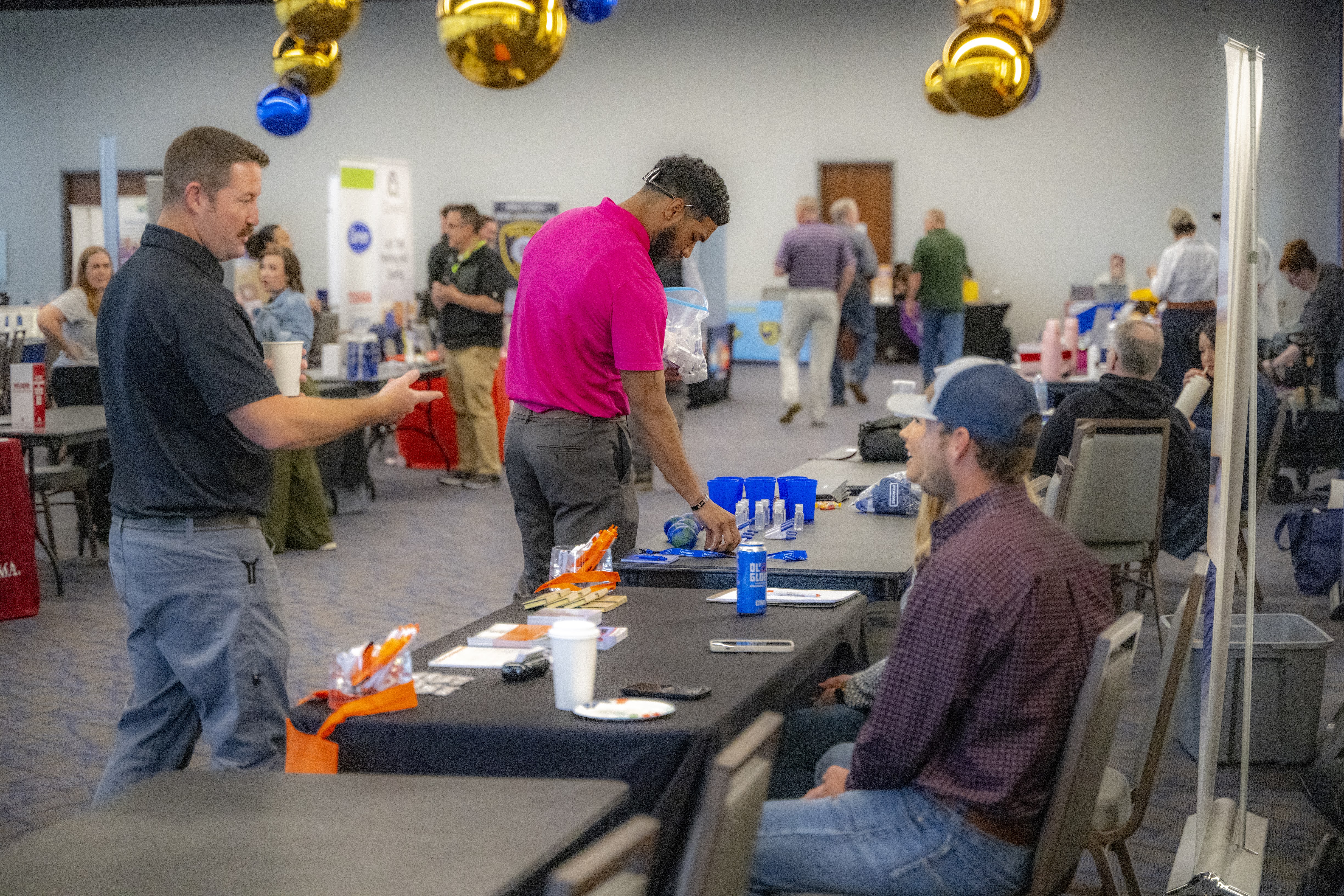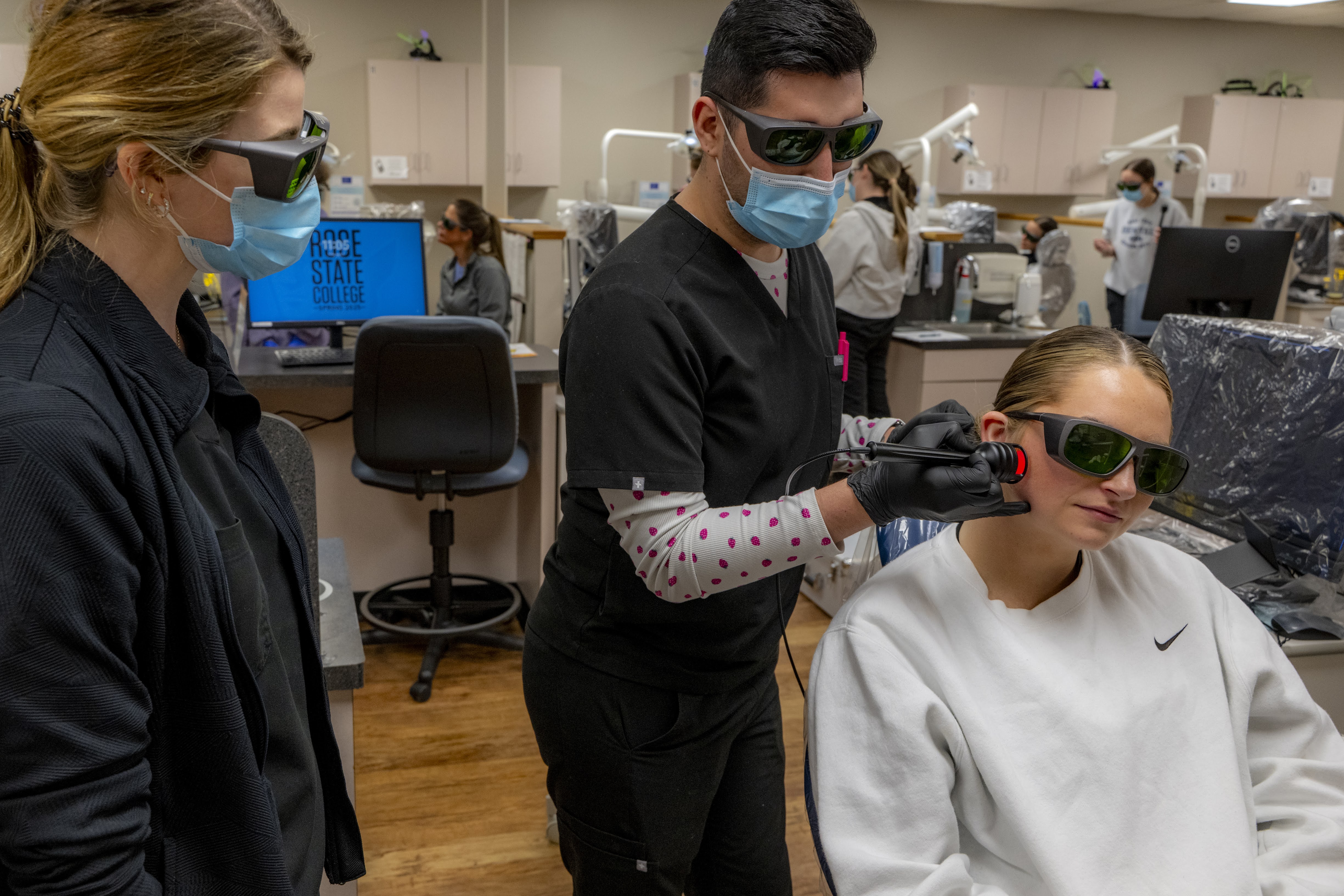Hardy, Mary
Born: 1920
Date Interviewed: April 1, 2003
Interviewer: Adam Hewett
Topic: Work experience during WWII
Q: When and where were you born?
A: I was born on the outskirts of South Haven, Kansas in 1920. I lived there until I was in about 8th or 9th grade. Then we moved again. I started high school. I was having severe headaches and I couldn’t function. When I finally got to the right doctor after seeing one who took my tonsils and wasn’t supposed to, I got to an ear, eyes, nose doctor and I had a mastoid. I had surgery and then I had to wear glasses.
Q: What were your interests and hobbies as a young woman?
A: I was raised with 10 brothers, so whatever they did, I wanted to do. I did a good job of keeping up with them! I loved to ride horses.
Q: When did you begin to get a sense that the US was headed toward war?
A: I had a husband in [the service] and I had four brothers in at that time, so I got the brainstorm that surely there was something I could do besides just sit at home and raise a little daughter that was 2 years old.
Q: Was it a pretty scary time? Kind of nerve wracking?
A: It wasn’t exactly nerve wracking, but it was just something that I felt like I needed to do because the boys were doing it. I needed to, too. That was the reason I started to school at the Armory building.
Q: What was your reaction?
A: There was a lot of things they were having us do that I was accustomed to doing anyway. I just sort of filled in where I thought I was needed.
Q: What was the atmosphere like and the mood of people in the town in which you lived?
A: Much different. Especially when we went out to the Douglas Building. You walked your legs off from one end to the other and you were supposed to go to a certain plane to do a certain thing.
Q: Were you married at the time? Or seeing anyone on a regular basis?
A: I was married at that time, and I was 19 when I got married. I had my daughter before I got involved in doing any work like that away from home.
Q: Did the two of you discuss how the war might affect your relationship?
A: No. The main time he got irked at me was when I transferred to Will Rogers Field because he had just made it onto day shift, and when I got out there, in order for me to work, I had to go to night shift, so he went to night shift too so that we could both get back and forth. And he had gotten Sunday off, but I messed up his schedule. But other than that, he did not mind me doing the work because he wasn’t jealous of anything I was doing in that line because he knew that I was a tomboy anyway.
Q: When did the government announce that the women were going to be brought into the defense industry?
A: I don’t really remember the exact date. I know it was either 1943 or 45 between there that we were able to get involved in it.
Q: What was your reaction at the time?
A: We were issued a tool box and so many tools and told what we were supposed to do with them. I didn’t know that we were called Rosie the Riveters then. It was not as well known then as it was later on. We just knew that we were going to be doing a man-like job that was needed. Things we did were needed.
Q: Were the jobs really as manly as they made it out to be, or were they simpler?
A: Well, it was simple, but yet some of it was pretty much needed to be done and enough of us together could fill the spot.
Q: How did the people close to you react to your decision?
A: Well, a lot of them thought our places were at home. We could do some band-aids or things of that nature rather than to be out there where the men were supposed to be. Whether we were supposed to be or not, didn’t matter. When I first went to Douglas Building I rode the streetcar downtown and the bus out to the base, but then later, he [husband] wasn’t using the car and we only had the one, so I drove it after that and hauled a neighbor next door to me who also worked out there.
Q: Did you know a lot of other women in your area that were also going to become involved?
A: I did at the time, but I never got to keep up with them since I left.
Q: How did the process unfold as you went from civilian to defense industry worker?
A: I hadn’t done any work outside of the home until I started that. I have since then. I retired from a hospital, but I hadn’t done any prior to that.
Q: What kind of pay did you receive?
A: It didn’t amount to much, but I don’t remember for sure what it was.
Q: How long did your employment last?
A: My employment with the government was about four years.
Q: What was the mood of your fellow female workers?
A: Fine. We got along. You might find a caddy one now and then, but nothing that bothered me in any way.
Q: Was there a sense of camaraderie among the female workers? Did you make any lifelong friends?
A: No, I wasn’t there long enough. But I have gone back to some of the occasions they have had at the base for Rosie the Riveters and I recognized them from when we were working and they recognized me, so we chit-chatted, but that was it.
Q: Did the women enjoy the work, or did the work prove difficult for some of the women?
A: Some of them might pass something off to somebody else if they didn’t want to do it, or didn’t think they were qualified, but otherwise, I think they all got along pretty well.
Q: Were the women from every kind of economic, racial, and social background?
A: Not like they are today. We didn’t have that many foreign people floating around.
Q: If so, could you please elaborate whether or not all women were treated equal or if some women, because of their background, had a more difficult time than others. Please feel free to expand on anything to do with this?
A: I think they were [treated equally]. I think we all were. Maybe some “doll” might have gotten more attention!
Q: What was the reaction of the fellow male workers?
A: If they weren’t too snotty, I got along with them fine.
Q: Did they treat you good?
A: Yes, I never ran any of them that I wasn’t treated very nice.
Q: How were you treated by the bosses who were in charge?
A: They more or less felt like they had to show us what to do, not just say “go and do so-and-so.” They were nice about it. They were reasonable, and glad to have somebody to do the little things that we could do.
Q: What was the overall atmosphere at Tinker Air Force Base and the surrounding area?
A: Alright. I lived on N.W. 29th, so the housing area here was just starting.
Q: What kinds of memorable occurrences did you witness or experience?
A: You always could reminisce back over things that you saw that you hadn’t been acquainted with. A lot of the planes – I hadn’t even flown at that time, so it was fascinating to be able to go all over the thing.
Q: After the war, was there any kind of pressure from the government and the media for women to leave the workplace and return to homes so that male veterans could once again have access to jobs?
A: I don’t think so. I think everyone was ready to give it back to them!
Q: When the war was over, did you quit working?
A: No. It was still going when I quit.
Q: How do you think the war years impacted the lives of women in this country?
A: I think it gave them more security in thinking they could qualify if needed.
Q: What impact did the working women of World War II and their experiences have on future generations of American women?
A: More or less made them feel more like they could do what they started out to do.
Q: Did the skills you learned during the war serve you in any kind of way in the subsequent years after the war?
A: When it come to tightening screws and things of that nature, I already knew that! So it didn’t benefit me in that respect.
Q: What things stand out most in regard to your experience as a Rosie the Riveter or any of the other kinds of work you did during World War II?
A: I guess just feeling like we were able to do our part. At least we were helping out. That gave us pretty much of a boost. I know before it was over I had five brothers in there and it just gave me a good feeling to think “well, gosh, I always tried to do what they did, but I can’t do what they’re doing now, but at least I’m doing my part.”
Q: What kind of lessons did you learn?
A: Take orders, I guess you’d say! Like I said, I had not worked out in the public life at all until then.
Q: If you would like to discuss or expand on anything at this time, please feel free to do so. Would you like to add anything?
A: My main trouble was worrying about my five brothers and if they were going to get home, and my husband, too. However, he was in 26 years and then got out. Before that, he was in and out, in and out, about three or four times. I said “look, we’re not going to wallpaper the house with discharges! So either get in or get out so we can know where we’re going to live.” We had bought this house in 1941 and we needed to make up our minds.
Q: Did your brothers come out of the war?
A: They came out all right. Mother had the little flag with all five stars on it on the window and was very proud of it. None of my brothers were injured health-wise. Mentally-wise, they get quite disturbed about things they recall, but they all came back. It was quite a large group for all of them to be able to return.



